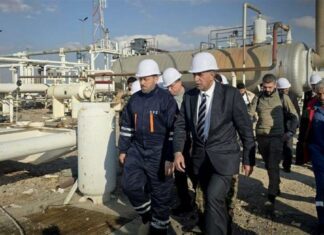
The Syrian opposition has strongly criticized attempts to normalize relations with the Assad regime, calling such efforts futile and counterproductive, as the regime continues to be implicated in severe human rights abuses. Speaking ahead of the United Nations General Assembly (UNGA), the head of the Syrian Negotiating Commission (SNC), Badr Jamous, described normalization as absurd given the regime’s role in the deaths of hundreds of thousands of Syrian citizens and the displacement of millions.
During a meeting on September 18 with Turkish officials, including Deputy Foreign Minister Nuh Yilmaz, Jamous emphasized the need for international adherence to the Geneva Statement and UN Security Council Resolution 2254, both of which lay the groundwork for a political solution in Syria. He called for increased efforts at the UNGA to mobilize support for these resolutions. “Any attempt to rehabilitate the regime is doomed to failure,” Jamous said, “as it will not erase the regime’s crimes or undo the destruction it has caused to Syria’s infrastructure and social fabric.”
Jamous reiterated the opposition’s stance that the Syrian people remain committed to their revolution and its goals of freedom, justice, and the establishment of a state governed by law. He stressed that true peace in Syria can only be achieved through the full implementation of the political solution outlined in international agreements.
International representatives at the UNGA echoed Jamous’s condemnation of the Assad regime. The United Kingdom and the US, in particular, criticized both the Assad regime and its allies for obstructing peace efforts and perpetuating violence.
In remarks during a Security Council session on Syria, British Foreign Secretary Fergus Eckersley denounced the Assad regime for exploiting instability for its own benefit, with the backing of Russia. He noted that the regime continues to commit atrocities, including widespread violence against civilians, while Russia provides political cover for these actions. “The violence across Syria remains unrelenting,” Eckersley said, adding that the ongoing conflict, including a resurgence of ISIS attacks, is fueled by the regime’s refusal to engage in genuine political dialogue.
The British diplomat also underscored the severe humanitarian consequences of the war, including the disruption of education for millions of Syrian children. “Thousands of children are being deprived of education and basic rights,” he stated, pointing out the UK’s efforts to support Syrian schools through international programs.
The US also took a strong stance against the Assad regime at the UN. US Ambassador Robert Wood emphasized the need for accountability for crimes committed by the Assad regime. In his address, Wood cited the findings of the latest International Commission of Inquiry report, which documented widespread human rights violations, including torture and gender-based violence. He called on the international community to hold the Syrian regime accountable for its atrocities, from the lowest-ranking perpetrators to the highest officials.
Wood also dismissed claims made by the Assad regime that the US was involved in supporting terrorism in the region, calling such allegations “absurd” and accusing the Assad regime of deflecting attention from its own crimes. He reaffirmed the US commitment to supporting humanitarian aid and ensuring that assistance reaches those in need, including through cross-border and conflict-line access.
“No aid is meaningful if it doesn’t reach the people who need it,” Wood said, underscoring the ongoing challenges in delivering humanitarian assistance to conflict zones, particularly in areas like the Rukban camp, where regime forces have repeatedly blocked aid efforts.
Both the US and UK reiterated their commitment to UN Resolution 2254, with calls for a renewed political process in Syria. Both nations stressed that there would be no lifting of sanctions or funding for reconstruction until the Assad regime shows a clear commitment to meaningful political reform.
As the international community grapples with the Syrian crisis, the Syrian opposition, backed by Turkey, continues to push for a political solution that aligns with the aspirations of the Syrian people. Jamous warned that normalization with the Assad regime would only further prolong the suffering of millions and perpetuate the cycle of violence that has gripped Syria since 2011.








